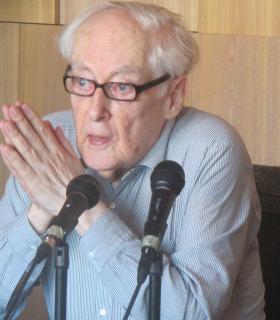Remembering Professor David Seyfort Ruegg
Today is the 21st day since the passing of Professor David Seyfort Ruegg, one of the most outstanding modern scholars in the field of buddha-nature and Middle Way studies. I first met Prof. Seyfort Ruegg in 1998 when I approached him with a request to be the external supervisor for my doctoral research on emptiness at Oxford. He had already retired from academic positions by then and was devoting his time to writing, but after my persistent requests during three visits, he kindly agreed, making me, to my knowledge, the last PhD student he formally supervised.
In the four years of doctoral work that followed, I would visit Prof. Seyfort Ruegg regularly to discuss the chapters of my thesis, which I would post to him a couple weeks in advance. If I failed to send a chapter on time, I would receive a short note as a polite reminder. Our meetings at his home in Cadogan Square in London would invariably begin with a glass of apple juice, one or two pieces of Duchy Originals shortbread, some pleasantries, and updates on Tibetan and Buddhist Studies before he delved into the detailed discussion and critique of what I had written. We spent hours going through my chapters page by page, the longest session being one from 2–10pm. The sessions were both taxing and uplifting, filled with advice and instructions on which book to read or word to choose, and a ruthless assessment of my writing.
Prof. Seyfort Ruegg was a king in his field. A leading authority on Middle Way and buddha-nature studies in the Indo-Tibetan tradition, he was relentless in the rigor, precision, clarity, and substance of his works. Two incidents still remind me of the high standard he held and wished his students to aim for. When I included a long critique of a certain author on Nāgārjuna in my writing, to my surprise, he dismissed it, saying the work in question did not deserve such attention and effort. After I submitted my thesis for viva voce, he insisted that I wait (which I did for eight months) to have accomplished scholars on the topic as examiners.
Born in 1931 in New York and having undertaken Indology and Tibetology in Paris for his university education, Prof. Seyfort Ruegg devoted much of his long and rich academic career to the study of buddha-nature and the Middle Way. Starting from his doctoral thesis, La théorie du tathāgatagarbha et du gotra, in 1969, he has written many books and articles on buddha-nature, including Le traité du tathāgatagarbha de Bu ston Rin chen grub in 1973, and Buddha-nature, Mind and the Problem of Gradualism in a Comparative Perspective: On the Transmission and Reception of Buddhism in India and Tibet in 1989. His writings on the Middle Way include, among other titles, his important work The Literature of the Madhyamaka School of Philosophy in India published in 1981, Studies in Indian and Tibetan Madhyamaka Thought, Part 1 & 2, and the most recent compilation of fifteen articles by him, The Buddhist Philosophy of the Middle: Essays on Indian and Tibetan Madhyamaka. His other writings include books and articles on linguistic philosophy, epistemology, hermeneutics, history and art, and many dozens of book reviews.
As a Sanskritist and Tibetologist, Prof. Seyfort Ruegg also held professorial chairs in Indian Philosophy, Buddhist Studies, and Tibetan Studies at major universities, including Leiden, Seattle, Hamburg, and the School of Oriental and African Studies at the University of London. He has supervised numerous students like myself, giving them his time and knowledge very generously. Despite his formidable output and renown for his work, David Seyfort Ruegg was, as a person, a quiet, private, and gentle being. His kindness and soft character was evident particularly in his care for his senile mother who lived with him. Our academic discussions in his house were at times interrupted by the care he was giving her.
David Seyfort Ruegg passed away on February 2, 2021 due to complications related to Covid-19. Far away in the midst of the land and people he studied, I lit a butter lamp in homage and chanted some heartfelt prayers. May his consciousness find peace, and may his wisdom and compassion continue to shine his own path and the paths of other sentient beings.
Karma Phuntsho
Writer-in-Digital-Residence
Weekly quote
The idea that the doctrine of the tathāgatagarbha and buddha-nature is one of the supreme teachings of the Mahāyāna is explicitly stated besides in the Mahāparinirvāṇasūtra.~ David Seyfort Ruegg

